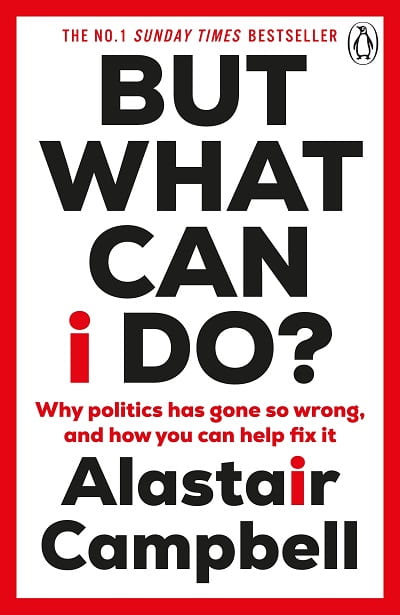Book review: But What Can I Do? By Alastair Campbell (Penguin, 2024)
Alastair Campbell’s new book is a bestseller across Britain not just because he writes well but also because thousands of readers acknowledge they should at least consider his message. Adrift in an election campaign featuring two leaders devoid of charisma, neither capable of promising credible improvements to infrastructure, inflation, health or immigration, British voters might reasonably ask: but what can I do?

Campbell, the Platonic form of spin doctor/special adviser, has written a self-help book. His proposals for redeeming British politics do not follow his own career trajectory. Summarised, that involves: establishing yourself as a journalist; finding a political candidate, Tony Blair, with whom you can nurture solid relations of mutual trust; shepherding that man to three consecutive election victories; then re-inventing yourself (through television series, columns, diaries and a podcast, The Rest is Politics) as a shrewd, wry analyst of current issues.
If anything, Campbell under-states the “deep sense of frustration and hopelessness” among the British electorate, and the corresponding equally urgent requirement for any new government to confirm its social license and regain moral authority. In Campbell’s cosmology, right-wing polarising populists are to blame for much of this malaise. His targets extend beyond Boris Johnson to include Donald Trump, Jair Bolsonaro and Scott Morrison.
That attribution of blame might seem biased, just as Campbell’s estimation of how rosy conditions were in the past (for him, critically, before the global financial crisis) may appear too sanguine. Should not electorates themselves bear some of the responsibility? Should institutions and habits not also be called into question? Campbell declares that “purpose and system won’t change by themselves” but devotes scant attention here to even beginner changes – abolition of the House of Lords, for instance, compulsory voting, or better alignment of financial rewards with social values.
In any event, Campbell moves on to offer guidance to putative young leaders. They are exhorted to resist cynicism, to become three things at once (leader, team player and strategist), to learn confidence and to acquire persevilience (a worthwhile Campbell coinage, blending perseverance and resilience). These worthies are meant to emerge from the political grassroots (“be local and be informed”) rather than any of the customary stables of privilege, whether Eton, Oxbridge or staff jobs in ministerial office.
Would such leaders have averted the “cocktail of calamity”, Campbell’s phrase, which has recently afflicted Britain? Ordinary folk might despair, quite rationally, about scandals with the Post Office or contaminated blood, lockdown parties, medical waiting lists, planned flights to Rwanda, or Brexit. Campbell would respond by arguing that “people with values, passion and real commitment are the cure”. In a typically pungent, pugnacious style, Campbell buttresses his argument with examples from many other fields of leadership, the most insightful being the case of soccer managers.
I wonder. Could leaders picked to “broaden the gene pool” simply burn out, be co-opted, seek office for its own sake, or give way to cynicism? Might the uneven performance of relative outsiders such as Obama, Trudeau and Macron prompt some second thoughts?

